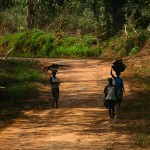 I awaken to the muezzin’s call to prayers—still dark, 6 am. I hear the sound of chopping wood, voices around the cooking fire.
I awaken to the muezzin’s call to prayers—still dark, 6 am. I hear the sound of chopping wood, voices around the cooking fire.
I am staying with Madame Yeamah, the aunt of my friend Jose Tenga. Madame Yeamah is the mammy queen, the most powerful woman in Sumbuya. I am drawn to the three girls Madame Yeamah cares for–Mamie, perhaps 8 or 9, Lucia, around 12 or 13, and Maserai, 16. Maserai has a little boy, Paul, a year and a half.
By 8 each morning the girls bring my breakfast. They will have been up for a couple of hours, doing chores in their tattered clothes, before changing into green uniforms and going off to school. They are as curious of me as I am of them.
They feed me first. Despite my many requests, they eat separately. A Mende person does not like to eat with a guest—the guest has only one place to eat, but they can eat with anyone. It is the way. Mende share from the same plate. I often ask the girls in, tell them I am a brother, so they can eat from my plate too. They love the peanut butter I brought–next time I’ll bring a larger jar.
I write, take photos, visit the schools, hangout on the veranda in the evenings. I’ve come here to research Part 2 for My Heart is Not My Own. It is everything I’d hoped for and more—this is the place I’ll use to model my fictitious village called Lileima (Peaceful Place, in Mende). It’s hard to imagine that Sumbuya was occupied by child soldiers and the RUF during the war. Across from me is a burned out house—there is another one a few doors down. The RUF left their mark.